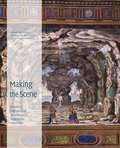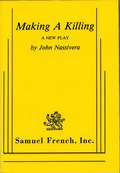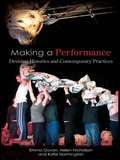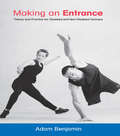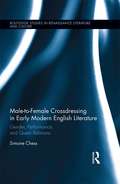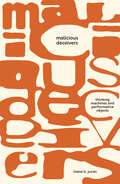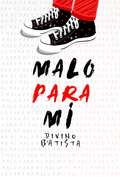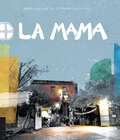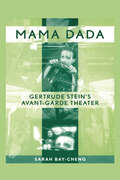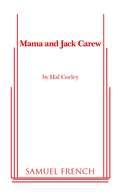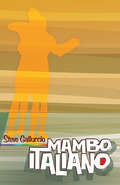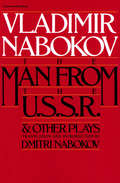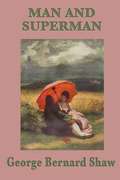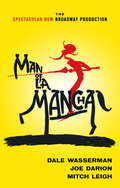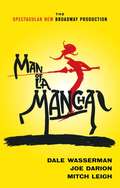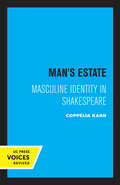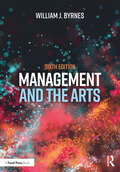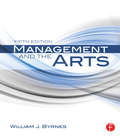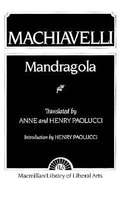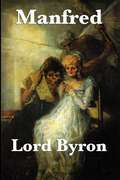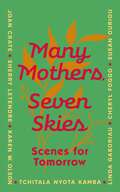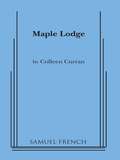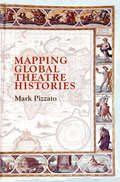- Table View
- List View
Making The Scene: A History Of Stage Design And Technology In Europe And The United States
by Oscar G. Brockett Margaret A. Mitchell Linda HardbergerTheatrical scene design is one of the most beautiful, varied, and lively art forms. Yet there are relatively few books on the subject, and almost none for a general audience that combine expansive scholarship with lavish design. Making the Scene offers an unprecedented survey of the evolving context, theory, and practice of scene design from ancient Greek times to the present, coauthored by the world's best-known authority on the subject and enhanced by three hundred full-color illustrations. Individual chapters of the book focus on Greece, Rome, Medieval Europe (including liturgical drama, street pageants, festival outdoor drama, Spanish religious drama, and royal entries), the Italian Renaissance, eighteenth-century Europe, Classicism to Romanticism, Realism and Naturalism, Modernism, and contemporary scene design. Making the Scene's authors review everything from the effects of social status on theatre design to the sea changes between Classicism, Romanticism, and Naturalism and the influence of perspective-based thought. Particularly intriguing is their rediscovery of lost tricks and techniques, from the classical deus ex machina and special effects in coliseums to medieval roving stage wagons and the floating ships of the Renaissance to the computerized practices of today's theatres. Such ingenious techniques, interwoven with the sweeping beauty of scene design through the ages, combine with the keen scholarship of Oscar Brockett and Margaret Mitchell to create a book as involving as the art it showcases.
Making a Killing
by John NassiveraFull length, thriller / 2m, 2f / Interior / A Broadway playwright, his conniving producer and his actress wife hatch a plot to guarantee their new play will be a success; they fake the suicide of the playwright on opening night! They then high tail it up to Vermont where the playwright hopes to disappear, as he hates the public spotlight anyway. However, after a few weeks the playwright decides he no longer wants to participate in the scheme. Maybe his wife and his producer who are having an affair will have to kill him for real! Also on the scene is the playwright's feisty agent, who uncovers the plot and then helps her client deal with his most difficult artistic challenge: foiling his producer and wife!
Making a Performance: Devising Histories and Contemporary Practices
by Katie Normington Helen Nicholson Emma GovanMaking a Performance traces innovations in devised performance from early theatrical experiments in the twentieth-century to the radical performances of the twenty-first century. This introduction to the theory, history and practice of devised performance explores how performance-makers have built on the experimental aesthetic traditions of the past. It looks to companies as diverse as Australia's Legs on the Wall, Britain's Forced Entertainment and the USA-based Goat Island to show how contemporary practitioners challenge orthodoxies to develop new theatrical languages. Designed to be accessible to both scholars and practitioners, this study offers clear, practical examples of concepts and ideas that have shaped some of the most vibrant and experimental practices in contemporary performance.
Making an Entrance: Theory and Practice for Disabled and Non-Disabled Dancers
by Adam BenjaminMaking an Entrance is the first ever practical introduction to teaching dance with disabled and non disabled students. This clearly written, thought provoking and hugely enjoyable manual is essential reading whether you're just starting out or are already active in the field.Taking improvisation as his focus and as the starting point of choreographic exploration, Adam Benjamin asks what it has to offer as an art form and how it can be better used to meet the changing needs of dance education.In the theoretical section Benjamin explores the history of a disintegrated dance practice, placing it within the wider context of cultural and political movements. He questions what is meant today when we talk about 'inclusive' or 'integrated dance' and what we might expect of it.The book includes over 50 exercises and improvisations designed to stimulate and challenge students at all levels of dance. Benjamin also includes useful hints on the practicalities of setting up workshops covering issues as diverse a class size, the safety aspects of wheelchairs and the accessibility of dance spaces.
Male-to-Female Crossdressing in Early Modern English Literature: Gender, Performance, and Queer Relations (Routledge Studies in Renaissance Literature and Culture)
by Simone ChessThis volume examines and theorizes the oft-ignored phenomenon of male-to-female (MTF) crossdressing in early modern drama, prose, and poetry, inviting MTF crossdressing episodes to take a fuller place alongside instances of female-to-male crossdressing and boy actors’ crossdressing, which have long held the spotlight in early modern gender studies. The author argues that MTF crossdressing episodes are especially rich sources for socially-oriented readings of queer gender—that crossdressers’ genders are constructed and represented in relation to romantic partners, communities, and broader social structures like marriage, economy, and sexuality. Further, she argues that these relational representations show that the crossdresser and his/her allies often benefit financially, socially, and erotically from his/her queer gender presentation, a corrective to the dominant idea that queer gender has always been associated with shame, containment, and correction. By attending to these relational and beneficial representations of MTF crossdressers in early modern literature, the volume helps to make a larger space for queer, genderqueer, male-bodied and queer-feminine representations in our conversations about early modern gender and sexuality.
Malicious Deceivers: Thinking Machines and Performative Objects (Sensing Media: Aesthetics, Philosophy, and Cultures of Media)
by Ioana B. JucanIn Malicious Deceivers, Ioana B. Jucan traces a genealogy of post-truth intimately tied to globalizing modernity and connects the production of repeatable fakeness with capitalism and Cartesian metaphysics. Through case studies that cross times and geographies, the book unpacks the notion of fakeness through the related logics of dissimulation (deception) and simulation (performativity) as seen with software/AI, television, plastics, and the internet. Specifically, Jucan shows how these (dis)simulation machines and performative objects construct impoverished pictures of the world, ensuring a repeatable sameness through processes of hollowing out embodied histories and lived experience. Through both its methodology and its subjects-objects of study, the book further seeks ways to counter the abstracting mode of thinking and the processes of voiding performed by the twinning of Cartesian metaphysics and global capitalism. Enacting a model of creative scholarship rooted in the tradition of writing as performance, Jucan, a multimedia performance-maker and theater director, uses the embodied "I" as a framing and situating device for the book and its sites of investigation. In this way, she aims to counter the Cartesian voiding of the thinking "I" and to enact a different kind of relationship between self and world from the one posited by Descartes and replayed in much Western philosophical and — more broadly — academic writing: a relationship of separation that situates the "I" on a pedestal of abstraction that voids it of its embodied histories and fails to account for its positionality within a socio-historical context and the operations of power that define it.
Malo para mí
by Divino B'AtistaLa suerte parece incluir un favor de Mateo tan pronto como consigue un trabajo en el restaurante donde trabaja Andrew, el chico de sus sueños. Siendo el romántico incurable que es, Mateo cree fielmente que puede convertir la amistad en un romance largamente esperado, el problema es que la vida está llena de sorpresas, y una de ellas va a sacudir completamente el corazón del chico, haciéndole entender que el amor no siempre es tan simple y color de rosa como imaginamos. Malo para mí es una historia ligera, con una trama atractiva y humorística, que hará reír y emocionar al lector hasta la última página. LEA TAMBIÉN, ESA MALDITA SONRISA.
Mama
by Adam CassIn August 2017, Melbourne's La Mama Theatre celebrates 50 years since the premiere of its first production, Jack Hibberd's 'Three Old Friends'. La Mama commemorates the rich life story of the theatre so far, tracking the history and chronology of the work that has been made and the many careers that have been born, raised and cherished there. Complemented by hundreds of wonderful photographs, the book is woven together through a series of rowdy yarns spun by the La Mama community, capturing a sense of the magic that has been inspiring audiences for fifty years.
Mama Dada: Gertrude Stein's Avant-Garde Theatre (Studies in Modern Drama)
by Sarah Bay-ChengMama Dada is the first book to examine Gertrude Stein's drama within the history of the theatrical and cinematic avant-gardes. Since the publication of Stein's major writings by the Library of America in 1998, interest in her dramatic writing has escalated, particularly in American avant-garde theaters. This book addresses the growing interest in Stein's theater by offering the first detailed analyses of her major plays, and by considering them within a larger history of avant-garde performance. In addition to comparing Stein's plays and theories to those generated by Dadaists, Surrealists, and Futurists, this study further explores the uniqueness of Stein via these theatrical movements, including discussions of her interest in American life and drama, which argues that a significant and heretofore unrecognized relationship exists among the histories of avant-garde drama, cinema, and homosexuality. By examining and explaining the relationship among these three histories, the dramatic writings of Stein can best be understood, not only as examples of literary modernism, but also as influential dramatic works that have had a lasting effect on the American theatrical avant-
Mama and Jack Carew
by Hal CorleyDramatic Comedy / 2m, 1f / Unit Set In the summer of 1969, Beau Stanley's last hurrah before heading off to study architecture in college, doting Mama Lillian vows to help him finally lose his baby fat. Armed with a supply of diet pills and a food-free regimen that includes tearing down a family room wall, 3 a.m. trips to Dulles Airport and blazing, amphetamine-fueled days on the beach, mother and son spend a memorable vacation together. But Beau's weight loss isn't restless Lillian's only project, and in an unguarded moment, she reveals her just-begun affair with a travelling defense contractor, Jack Carew. Once Lillian introduces son and lover, Beau's caught in the oedipal crossfire of a covert and explosive new alliance, forced to cover his Mama's many absences from home. Over the next decade, Jack's repeated pledge to end his own loveless marriage and sweep Lillian away proves a hollow promise. As increasingly beleaguered Beau sacrifices his own independence to help his mother confront her disillusionment and finally, betrayal, parent-child roles are turned upside down. Mama and Jack Carew is a harrowing, oftentimes black-comedic portrait of an unlikely triangle.
Mambo Italiano
by Steve GalluccioMambo Italiano achieves its overwhelming power through a perfect balance of fast-paced comedy and poignant drama. Angelo, at the prompting of his equally repressed sister Anna, has told his very traditionally Italian immigrant parents, Maria and Gino, that he is gay. Hurt, betrayed and mortified by Angelo's coming out, his lover Nino is not unprepared for his widowed Italian mother Lina's reaction--a full-on operatic barrage of melodrama and hysterical excess so profound it gives even Angelo's shocked parents pause for second thoughts and prompts a hilarious and touching re-examination of their own outraged response to their son. Seeing their relationship shattered by their families' reactions of grotesquely overplayed comedy and pathos, Angelo emerges from the drama with his new-found pride intact, while Nino retreats even further into the darkness of his bisexual closet. While the press has often called the film version of Mambo Italiano "a gay My Big Fat Greek Wedding," there is far more at work in the play than the zealous mining of Italian immigrant family and gay culture stereotypes. Translated by Michel Tremblay, its huge fan, into a wildly successful Francophone theatrical phenomenon, Mambo Italiano is far more about the dynamics of family, about the vast spaces between the old world and the new, about grasping the resonant codes embedded in what is said and what is meant in ordinary speech, than it is "about" gay culture. In perhaps the play's most defining scene, the parish priest has been bribed with a bottle of wine and a carton of cigarettes to vacate his confessional so it can be occupied by the members of Angelo's family to ritually unburden themselves of their hilarious sins of personal hypocrisy, willful misapprehension and thoughtless transgression. Cast of 4 women and 3 men.
Man From The USSR & Other Plays: And Other Plays
by Vladimir NabokovFour plays and two essays on drama, written during Nabokov's émigré years before his writings in English earned him worldwide fame. Translated and with Introductions by Dmitri Nabokov.
Man and Superman
by George Bernard ShawOne of Shaw's finest and most devilish comedies, Man and Superman portrays Don Juan as the quarry instead of the huntsman. John Tanner, upon discovering that his beautiful ward plans to marry him, flees to the Sierra Nevada mountain range, where he is captured by a group of rebels. Tanner falls asleep, and dreams the famous "Don Juan in Hell" sequence, which features a sparkling Shavian debate among Don Juan, the Devil, and a talkative statue. With its fairy-tale ending and a cast literally from hell, Man and Superman is a hilarious cocktail of farce, Nietzschean philosophy, and Mozart's Don Giovanni.
Man of La Mancha
by Dale WassermanWinner of the New York Drama Critics Award for Best Musical, 1966"To me the most interesting aspect of the success of Man of La Mancha is the fact that it plows squarely upstream against the prevailing current of philosophy in the theater. That current is best identified by its catch-labels--Theater of the Absurd, Black Comedy, the Theater of Cruelty--which is to say the theater of alienation, of moral anarchy and despair. To the practitioners of those philosophies Man of La Mancha must seem hopelessly naive in its espousal of illusion as man's strongest spiritual need, the most meaningful function of his imagination. But I've no unhappiness about that. "Facts are the enemy of truth," says Cervantes-Don Quixote. And that is precisely what I felt and meant."--Dale Wasserman, from the Preface.From the Trade Paperback edition.
Man of La Mancha: A Musical Play
by Dale WassermanThis is a powerful story of a man, disillusioned with everyday life, who decides to become a Knight Errant and go out forth into the world righting all wrongs.
Man's Estate: Masculine Identity in Shakespeare
by Coppelia H. KahnThis title is part of UC Press's Voices Revived program, which commemorates University of California Press’s mission to seek out and cultivate the brightest minds and give them voice, reach, and impact. Drawing on a backlist dating to 1893, Voices Revived makes high-quality, peer-reviewed scholarship accessible once again using print-on-demand technology. This title was originally published in 1981.
Management and the Arts
by William J. ByrnesThe sixth edition of Management and the Arts has been revised and updated with the latest concepts, theories, and practices to meet the evolving demands faced by arts managers in cultural organizations around the world. This comprehensive textbook covers a wide range of topics, including planning, strategy development, leading, marketing, fundraising, budgeting, finance, staffing, and operations. The book takes an interdisciplinary approach as it explores how arts managers and leaders can develop equitable, collaborative, and dynamic organizations that bring communities together to experience all the arts have to offer. It also includes illustrations, tables, tools, techniques, and case studies that can be applied in a wide range of visual and performing arts organizations. Each chapter features terms, learning outcomes, real world examples, and discussion questions designed to help students build skills, develop strategies, and understand options to consider in meeting the challenges faced by cultural organizations. New to this edition: An extensive focus on how arts managers and organizations can successfully engage in developing and implementing equity, diversity, and inclusion programs Expanded content on leadership, marketing, social media, and fundraising theories, practices, and ethics Updated content about planning and assessment, business models, entrepreneurship, and heuristics Expanded coverage of organizational culture and its impact on programming, operations, and inclusion Additional perspectives about leading in the arts, examination of theories of motivation and communication, and expanded discussion on leadership ethics Integration of topics on operations, budgeting, and finance including technology and CRM systems Suggested additional readings, website links, and a broad array of other resources have been carefully gathered to help faculty guide students of Performing Arts programs and Arts Management courses as they explore what is required to work with artists, board members, staff, funders, volunteers, and community leaders. Management and the Arts includes access to a companion website featuring a sample syllabus, additional project assignments, suggested resources, and chapter-by-chapter PowerPoint slides (www.managementandthearts.com).
Management and the Arts
by William James ByrnesThe fifth edition of Management and the Arts provides you with theory and practical applications from all arts management perspectives including planning, marketing, finance, economics, organization, staffing, and group dynamics. Regardless of whether you are a manager in a theatre, museum, dance company, or opera, you will gain useful insights into strategic planning, organization, and integrated management theories. Case studies, statistics, and real-world examples will allow you get a handle on all aspects of arts managements, from budgeting and fundraising, to e-marketing and social networking, to working effectively with boards and staff members. Revised to reflect the latest thinking and trends in managing organizations and people, this fifth edition features class-tested questions in each chapter, which help you to integrate the material and develop ideas about how the situations and problems could have been handled. Case studies focus on the challenges facing managers and organizations every day, and "In the News" quotes give you real-world examples of principles and theories.
Mandragola
by Niccolo Machiavelli Anne Paolucci Henry PaolucciWritten somewhere between 1512 and 1520, this is a comedic play in which a love stuck young man tries to win the affections of the young, beautiful wife of an old doctor.
Manfred
by Lord ByronManfred, a Faustian noble, is tortured by guilt over the death of his beloved, Astarte. He uses his mastery of language and spell-casting to summon seven spirits, from whom he seeks forgetfulness. The spirits are unable to control the past and thus cannot grant Manfred's plea.
Manonmaneeyam
by P. Sundaram Pillai"Manonmaneeyam" tells us about the harm done by the wicked to the good, and how ultimately the good emerges victorious. This play is unique in the sense that, like English plays, it is divided into Acts and Scenes.
Many Mothers, Seven Skies: Scenes for Tomorrow
by Joan Crate Cheryl Foggo Tchitala Nyota KambaA diverse group of seven writers comes together to create seven tender scenes about their hopes for the future."The seven of us, a diverse group of elders, have endured, loved, lost and celebrated life in our own ways. Now, we decided, we would write a production for the stage, voicing our different experiences and what we came to realize are similar concerns about the future of our families, our planet, its peoples and its incredible network of flora and fauna."The Many Mothers Collective came together during the pandemic, hoping to make sense of the world that they found themselves in. What they found is that they needed to focus not only on the present moment, but on the world they would leave for their children and grandchildren -- and for seven generations into the future. In seven scenes for the stage, they explore where we have come from and where we are going, with a deep hopefulness rooted in resistance.
Maple Lodge
by Colleen CurranFull Length, Comedy / 2 m., 3 f. / Heather, Dennis and Tara are opening their cottage, Maple Lodge, for the summer and are expecting their formidable mother. The three a college administrator, a pharmacist and a twice divorced TV anchor woman have been coming to Maple Lodge all of their lives and Tara assures everyone that this summer will be the same as always once this weekend is over. She is wrong. Everything changes with the arrival an exotic stranger. In the meantime, Mother has won a Suitcase Dance to Mexico and will miss the big event Tara is hosting: the raising of a covered bridge to replace the beloved one burned to the ground by the Kingman brothers twenty five years ago. Her co chairman on the bridge committee, a local lumberman, just happens to be in love with Heather. Maple Lodge has kept many secrets, but they all come out this weekend. / Winner of the Samuel French Canadian Playwrights Contest.
Mapping Global Theatre Histories
by Mark PizzatoThis textbook provides a global, chronological mapping of significant areas of theatre, sketched from its deepest history in the evolution of our brain's 'inner theatre' to ancient, medieval, modern, and postmodern developments. It considers prehistoric cave art and built temples, African trance dances, ancient Egyptian and Middle-Eastern ritual dramas, Greek and Roman theatres, Asian dance-dramas and puppetry, medieval European performances, global indigenous rituals, early modern to postmodern Euro-American developments, worldwide postcolonial theatres, and the hyper-theatricality of today's mass and social media. Timelines and numbered paragraphs form an overall outline with distilled details of what students can learn, encouraging further explorations online and in the library. Questions suggest how students might reflect on present parallels, making their own maps of global theatre histories, regarding geo-political theatrics in the media, our performances in everyday life, and the theatres inside our brains.
